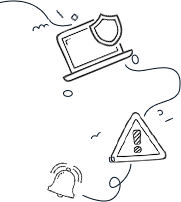Mythbusting AI: Why Your Toaster Isn’t Plotting to Steal Your Job
Let’s clear up a few of the most common myths about AI in the workplace!
The post 3 Common Myths About AI appeared first on Cybersafe .

Introduction
Did you know? Healthcare data is not only among the most sensitive and valuable information out there, but it’s also like the golden ticket for cybercriminals. You’d think hackers had a VIP pass to this party! When healthcare organizations experience data breaches, it’s like a game of hot potato—but instead of a potato, it’s your private data, and no one wants it! The consequences can be far-reaching—not just for the institutions, but for the unsuspecting individuals whose data goes on an uninvited journey.
Let’s break down how these breaches on your PHI can lead to disastrous consequences, including identity theft and, yes, even insurance fraud (cue dramatic music)!
What’s at Stake in a Healthcare Breach?
Healthcare records are like a treasure map for hackers. Forget stolen credit card numbers that can be canceled faster than you can say “Jackpot!” Medical data? Now that’s hopelessly personal and often a permanent fixture. A typical healthcare record might include your…well, let’s just say it’s not just your favorite pizza topping.
This comprehensive profile makes it a cakewalk for criminals to impersonate you and throw a party with your identity. That’s one reason that personal health information (PHI) is like a shopping list for thieves. These records sell for as little as $60 on the Dark Web. Yes, you heard that right! And they can go for thousands if you’re really popular.
How PHI Theft Affects You
So why are healthcare breaches more popular than avocado toast? Once cybercriminals snag your data, they can go on a shopping spree—opening new credit accounts, filing fraudulent tax returns, or applying for loans. All the fun stuff that makes you question your life choices!
Victims often don’t realize their identity has been stolen until they’re denied credit, receive bizarre medical bills, or see their accounts throwing them a surprise party with questionable activities. Enter the notorious Medical identity theft. This sneaky trick happens when someone borrows your personal info to get medical treatment, fill prescriptions, or submit insurance claims. It can lead to mix-ups in your medical records—like getting a doctor’s note for a condition you never had. Talk about an unwelcome twist in your health history!
Insurance Fraud: Another Costly Consequence
But wait, there’s more! Threat actors also utilize stolen healthcare data to commit insurance fraud. This might involve:
These shenanigans drive up healthcare costs for everyone and can even land innocent victims in legal hot water for crimes they didn’t commit. Not the kind of surprise you want in your life!
Protecting Your PHI
The fallout from a healthcare data breach can hang around longer than an annoying song stuck in your head. Victims may face damaged credit scores, legal disputes over fraudulent charges, and hours of resolving identity drama. Sounds like a Netflix series, right?
While you can’t always prevent a breach, here’s how you can shield yourself like a medieval knight:
Real World Incidents
A third-party dental marketing agency recently made headlines for all the wrong reasons, suffering a massive data breach that exposed personal info from over 2.7 million patient profiles, along with 8 million appointment records. Ouch!
The breach happened due to an unsecured database—which is like leaving your refrigerator open at a summer picnic. The leaked information included names, addresses, phone numbers, insurance details, and even some medical histories. Talk about a recipe for disaster!
Experts predict that such breaches can have long-term consequences for victims, such as financial loss, shattered credit, and compromised medical records. Yikes!
This incident highlights the growing risks associated with third-party vendors in the healthcare industry, reminding us of the urgent need for fortified data security practices. Let’s get our act together, folks!
Conclusion
Healthcare data breaches are more than just IT mess-ups. They’re deeply personal and, unlike other cyber mishaps, the intimate nature of your medical info makes these incidents even more invasive. Recovering from them can feel like trying to untangle a pair of earbuds.
The more you understand the threats to your PHI, the better you can protect your healthcare data from those cyber baddies. Remember, knowledge is power (and a dash of humor doesn’t hurt either)!
The post How Healthcare Data Breaches Fuel Identity Theft and Insurance Fraud appeared first on Cybersafe.
Let’s clear up a few of the most common myths about AI in the workplace!
The post 3 Common Myths About AI appeared first on Cybersafe .
A PHI breach on Blue Shield has millions of patients wondering about the security of their healthcare data. What does it mean for healthcare patients moving forward?
The post Inside the PHI Breach at Blue Shield appeared first on Cybersafe .
Why are there blocked websites on your work WiFi?
Dive into how restricting certain sites can help maintain a more secure and productive work environment.
The post Why Are There Blocked Websites on Work WiFi? appeared first on Cybersafe .


Contact Us
Send a Message
